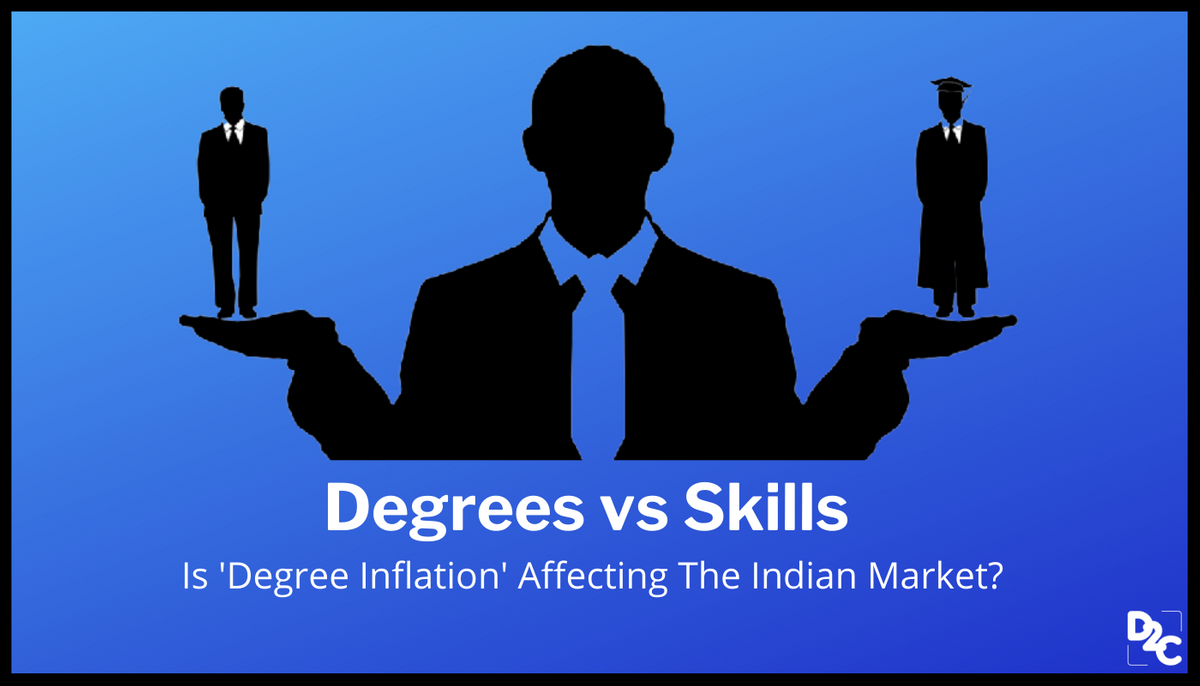Degrees Vs Skills: How Has 'Degree Inflation' Affected Education In India?

In the last ten years, ‘degree-inflation’ has significantly affected recruiting practices across the industry. While recruiters in the US were the first to adopt this trend, it is gradually catching up in India as well. As hiring trends start changing across the market, we look back at an old question - is degree still relevant for a job?
The relevance of ‘degree-inflation’ has escalated in India with classes shifting to a virtual mode after the onset of the Covid 19 pandemic. Due to the limitations of skilling students in virtual classrooms, it became hard for recruiters to ascertain if a candidate has the right skill set for a job. Many experts have even gone to the extent of suggesting that the challenges associated with ‘skilling’ are bigger than the issue of physical vs virtual classes.
As a result of this, academic institutions are finding it difficult to ensure that the students are developing the skills necessary to succeed in a job. Recruiters, on the other hand, are coming up with innovative ways of hiring candidates that can look beyond the degree certificate. The overall consequence of this trend is a completely altered job market where it's hard to determine if a degree will actually get you a job.
Also read | Indian Students In Ukraine Crisis: What Makes Them Pursue MBBS Degree Abroad?
Dealing with this trend can be confusing and chaotic at the same time. In order to address the concerns of students, we examine here how the changing relevance of degrees is affecting hiring practices across the industry. Later, we have also discussed the different ways in which the issue can be addressed in the long run.
Disappearing Degree Requirements In Jobs
In a recent survey conducted by Emsi Burning Glass in collaboration with Harvard Business Review, more than 50 million job posts between 2017 and 2020 were analyzed to see if there has been any change in the outlook of recruiters in the US when it comes to skill-based hiring.
Unsurprisingly, the research concluded that there has indeed been a reset in degree requirements for a wide variety of roles across the US. The change was most visible in the middle-skill positions, or for roles that don’t require a four-year degree. At the same time, even in high-skilled positions, the trend of ‘degree-inflation’ is quite apparent.
The research highlighted two broad reasons behind such a transformation - they have been listed below.
- The onset of a bull market between 2017-2019 indicated a possibility of market expansion.
- The effect of the Covid 19 pandemic on the market and the changes it led to.
In India, the situation is more or less similar, but there are a few marked differences too. Even though skills are given more priority than degrees in India, the latter is still relevant to the hiring process. For instance, according to a report compiled by Teamlease, the Covid 19 pandemic has created a surge of jobs in the highly-skilled specialized sector where skills matter more than degrees. On the other hand, for mid-skilled jobs in India, degrees still hold a lot of value.
Advantages of Skill-based Hiring
“Skills, not schools. Performance, not pedigree. Results, not requirements,” writes Gopika Maya Santosh, thought leader and in charge of analytics at LinkedIn. Gopika tells stories through data, and in one such story, she has emphasized why skill-based hiring is a win-win solution for both the employer and the employee.
According to her, skill-based hiring has the following key advantages over traditional recruitment.
- Gives employers access to an often-overlooked but highly-skilled talent pool.
- Gives opportunities to deserving candidates.
- When employers hire without degrees, it shows an intention to invest in the development of the employee, thereby adding value to their careers.
In order to make her point clearer, Gopika writes that even big companies have stopped mandating bachelor’s degrees as a criterion for hiring. She quotes data compiled from LinkedIn to show that around 20% of all manager hiring that took place via LinkedIn in 2020 did not have a compulsory requirement for a four-year degree.
Also read | These Founders Donated INR 14 Crores To Their Alma Mater IIT Madras
According to her, a company that prioritizes certain kinds of networks and referrals eventually ends up with the same kind of employees, leading to lesser diversity in the workforce. She also explains that when skill-based hiring takes place, workers have a higher chance of staying on the job, thereby increasing a company's workforce retention.
'Addressing The Problem, Instead Of Fixing The Measure'
Vatsalya Srivastava, assistant professor of economics at Jindal School of Government and public policy points out the challenges associated with identifying the skills of a potential employee. Not only does it make the process tougher for HR executives but also poses serious difficulties in mapping the skill level of a country. “Therefore, we typically rely on a wide array of proxy measures to estimate the quality of human resources,” he says.
But what is the root of the problem? Professor Srivastava says that while measuring the education level of a country, we mostly rely on how much time students are spending at school. The general thrust of policies related to education is optimized accordingly so that more students spend more time at school. However, merely spending hours at school cannot possibly guarantee skill development.
On top of that many educational institutes lower their evaluation methods to make sure that more students can get promoted to the next grade. Professor Srivastava says that while such an approach can ensure that more students are able to get higher degrees or graduate from schools, the issue of skill development remains unaddressed.“I am sure nobody needs me to point out the repercussions of having an education system that aims to certify a person’s ability to take exams rather than their competence in specific areas,” he writes.
Conclusion
While employers in India are keen to make skill-based hiring the standard practice, the difficulties associated with it are proving hard to navigate. The most preferred solution to this is to incorporate a model that shifts the focus from obsessing over degrees to motivating students, so that they learn to better themselves. The problem ultimately lies with the education system and the culture it promotes.
You might also be interested in reading.
- Why do 90% of the startups fail? Address the general know-how’s and learn how to succeed
- Can you win the startup race without a unique business idea? | Success story of boAt
- The secret behind the booming growth of Made-in-India D2C company, Mamaearth
- From Living In Slums To Battling A Rare Bone Disease; IAS Unmul Kher Secured AIR 420 In UPSC Against All Odds
- B.Tech to IIM to IAS Officer | How Switching Careers Took IAS G. Lakshmikanth Reddy To His Dream Job
Login to continue reading
And access exclusive content, personalized recommendations, and career-boosting opportunities.














Comments
Add comment